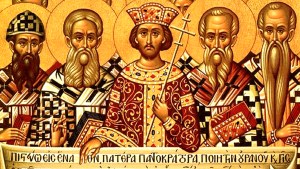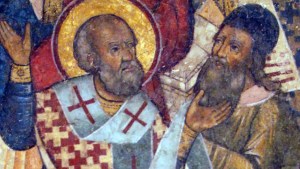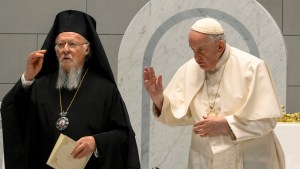Lenten Campaign 2025
This content is free of charge, as are all our articles.
Support us with a donation that is tax-deductible and enable us to continue to reach millions of readers.
In a letter to Patriarch Bartholomew, head of the Orthodox Patriarchate of Constantinople, made public on November 30, 2024, Pope Francis reconfirms his desire to visit Turkey in 2025. The occasion would be to celebrate the 1,700th anniversary of the Nicene Creed.
He thanks “all those who have already begun working” to prepare this trip, which could take place in May.
Remembering a milestone for the Church and for humanity
In 325, the first ecumenical council brought together more than 300 bishops from East and West, from different Patriarchates and Churches, in Nicaea (today Iznik, about 80 miles southeast of Istanbul). The profession of faith — the Creed — that was drawn up at that time has gone down in history as the first great text to sum up the Christian faith. It is still recognized as central by Catholics, Orthodox, and some Protestants. It is the Creed usually prayed at Sunday Mass, longer than the version known as the Apostles’ Creed.
Francis has already repeatedly expressed his wish to celebrate this anniversary alongside Patriarch Bartholomew, whom he has met some 15 times since 2013 and with whom he has forged a friendly relationship. The Patriarch has also mentioned his desire to make the anniversary with the Pope.
On Thursday, the Pontiff assured the audience at the International Theological Commission that he was “planning on going” to the commemoration.
In that same discourse, he described the Council of Nicaea as “a milestone in the history of the Church but also of humanity as a whole, because faith in Jesus, the Son of God made flesh ‘for us and for our salvation,’ was defined and professed as a light that illumines the meaning of reality and the destiny of all history.”
An invitation to live in unity, justice, and peace
This leads to a fundamental ethical principle of Christianity, he explains. “The Council of Nicaea, in stating that the Son is consubstantial with the Father, highlighted something essential: In Jesus, we come to know the face of God and, at the same time, the face of humanity, and thus realize that we are sons and daughters in the Son and brothers and sisters of one another.”
This message is especially relevant at this moment in history. “In today’s complex and often polarized world, tragically marred by conflicts and violence,” Pope Francis went on to say, “the love of God revealed in Christ and bestowed on us in the Spirit becomes an invitation to every man and woman to learn how to live fraternally and become an artisan of justice and peace.”
Once again, the head of the Catholic Church has referred to his plan to be present for the anniversary in a letter to Bartholomew delivered by Cardinal Kurt Koch, Prefect of the Dicastery for Promoting Christian Unity. Koch recently visited the Patriarchate on the occasion of the feast of the Apostle Andrew on November 30.
It’s customary for a Vatican delegation to travel to the Phanar to take part in the celebrations of the patriarchate’s patron saint. Andrew, known as the first-called because it was he who met Jesus and then invited his brother Peter to meet him, is held as the patron of the Orthodox. The pope, of course, is the successor of Peter. Nicaea is important for both the Orthodox and Catholic as it took place several centuries before the two Churches divided.
Hope for progress in ecumenism
In this letter to the Patriarch, the Pope mentions the 17th centenary of the Council, confirming that preparations for a possible meeting have already begun. “I have already expressed several times my desire to be able to celebrate this event together with you, and I sincerely thank all those who have already begun working to make that possible,” he declares.
The Argentine pontiff stresses that this anniversary “will concern not only the ancient Sees that took part actively in the Council, but all Christians who continue to profess their faith in the words of the Nicene-Constantinopolitan Creed.”
Sixty years after the promulgation of the Vatican II decree Unitatis Redintegratio, in which the Catholic Church committed itself to the ecumenical movement, Pope Francis acknowledges that “divisions dating back a millennium cannot be resolved within a few decades.”
However, he exhorts not to “lose hope that this unity can be achieved in the course of history and within a reasonable time.”
To pursue this rapprochement, the Pope urges Catholics and Orthodox to “listen to each other without judging or condemning.” He cites the recent experience of the debates during the Synod on Synodality, a project he launched in 2021 to make the Catholic Church less clerical and more participatory. Metropolitan Job of Pisidia took part in the last world session, in October, as a delegate of the Ecumenical Patriarch of Constantinople.
In 2025, the East and the West also will celebrate Easter on the same day.






